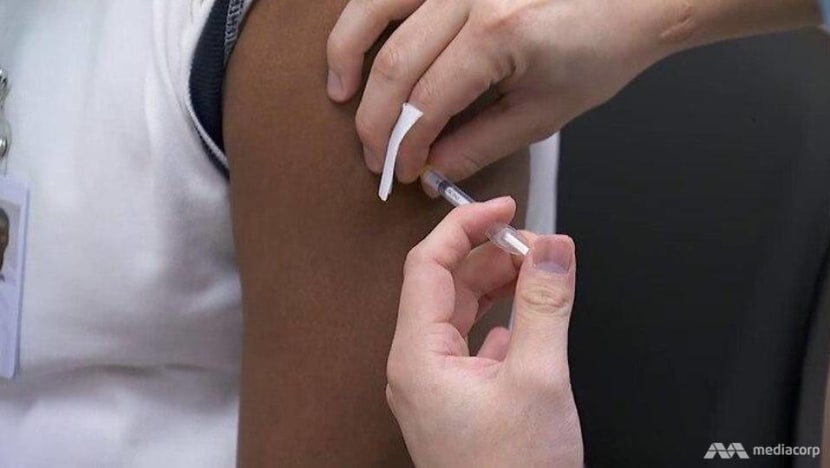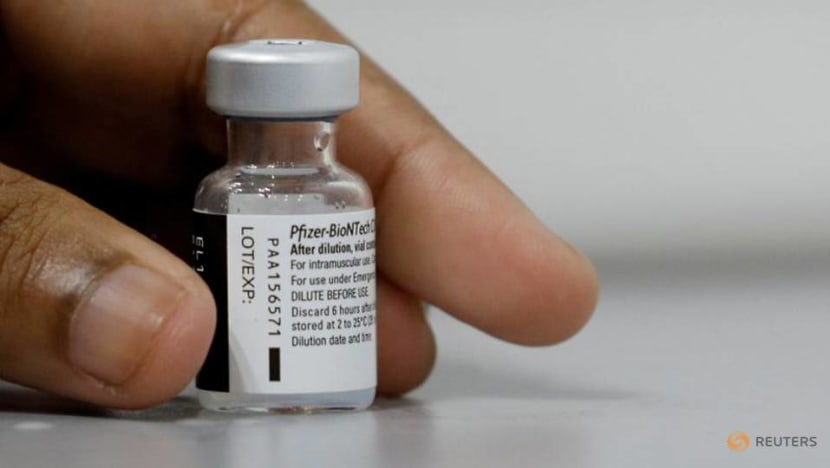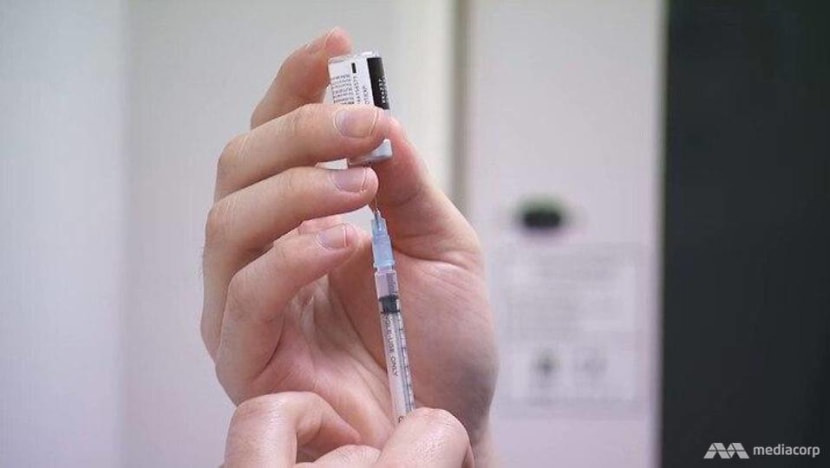FAQ: What you should know about getting infected after COVID-19 vaccination

A healthcare worker at National Centre for Infectious Diseases receives one of the first doses of the COVID-19 vaccine in Singapore on Dec 30, 2020.
SINGAPORE: A dormitory resident in Singapore contracted the coronavirus despite having completed the full COVID-19 vaccination regimen, sparking questions about how this can happen and the effectiveness of the jab.
The 23-year-old Indian national was the first such case reported by the Ministry of Health (MOH), which said it is a "reminder" that it is possible for vaccinated individuals to get infected.
He received his first dose of a COVID-19 vaccine on Jan 25 and the second dose on Feb 17.
His infection was detected when he was swabbed on Apr 7 as part of rostered routine testing. The man's earlier tests from routine testing - the last being on Mar 24 - were all negative for COVID-19.
READ: Migrant worker who tested positive for COVID-19 completed vaccination
Similar cases have been reported around the world.
In the United States, for instance, three out of nearly 5,000 vaccinated people in an April report by the Centers for Disease Control and Prevention (CDC) had confirmed infections after they were fully inoculated.
CNA spoke to infectious diseases experts about getting infected after vaccination.
Q: What are the chances of getting COVID-19 after vaccination?
It is rare, but not impossible.
While COVID-19 vaccines are highly effective, none are 100 per cent effective.
“Although the currently approved mRNA vaccines are very effective, we must remember that prevention of symptomatic COVID-19 occurred for approximately 94 to 95 per cent of participants in the clinical trials,” said Associate Professor Hsu Li Yang, Infectious Diseases Programme Leader at the National University of Singapore’s Saw Swee Hock School of Public Health.
The Pfizer-BioNTech and Moderna COVID-19 vaccines – both used in Singapore – are mRNA vaccines.
READ: Moderna's COVID-19 vaccine authorised for use in Singapore
Assoc Prof Hsu noted that the “real world” experience in the United States and Israel shows that the vaccine efficacy was less than 90 per cent.
“What this means is that one in 20 persons on average would still develop COVID-19 if exposed to the virus,” he said.

He added that the chances in Singapore “are very low simply because there is minimal spread of COVID-19 in the community”.
“As an illustration, there has only been one reported infection post-vaccination in our dormitory migrant worker community so far despite regular testing, whereas a significant proportion has already been vaccinated,” he said.
Senior consultant in the Division of Infectious Disease at the National University Hospital Dale Fisher said there is “hardly any chance of getting COVID-19 in Singapore ... especially if you are vaccinated”.
“This is because of the social measures still in place and the fact that we currently have good control. It doesn’t have to be this way and this is why the measures will likely be removed only gradually and slowly as vaccination rates pick up,” Dr Fisher said.
The chances of infection after vaccination depends on the prevalence of the disease, said the president of the Asia Pacific Society of Clinical Microbiology and Infection Paul Tambyah.
He gave the example of the “pivotal” Pfizer-BioNTech study conducted in the United States, Europe, South America and South Africa. It showed that there were nine cases of COVID-19 at least seven days after the second dose among 19,965 vaccine recipients and 169 among 20,172 placebo recipients.
“Bottom line is that it is rare to get the disease after vaccination but not impossible,” said Professor Tambyah.
Q: Why do people get infected with COVID-19 after completing vaccination?
This happens because the strength of the immune response varies across individuals after vaccination, Assoc Prof Hsu said.
“For those whose immune systems are compromised, and even for some ... that have otherwise normal immune systems, an adequate immune response that would prevent infection might not develop after exposure to the virus, resulting in infection,” he added.

The mRNA vaccines teach cells how to make at least a piece of a protein that triggers an immune response inside the bodies of those who are vaccinated.
Dr Fisher added that the vaccine is not 100 per cent effective. If it is 90 per cent effective, 10 per cent are still vulnerable, he said.
“This is fully expected. The World Health Organization initially set a target of at least 50 per cent efficacy,” he said.
If a person falls sick after vaccination, it is “very, very acceptable, very expected because of vaccine failures”, said Dr Leong Hoe Nam, infectious diseases expert from Mount Elizabeth Novena Hospital.
Professor Leo Yee Sin, executive director of National Centre for Infectious Diseases (NCID) said that some countries are seeing a resurgence of COVID-19 cases "partly due to emerging variants of concern with better ability to transmit".
"Humans develop immunity through natural infection or vaccination to counter the virus. However, viruses like the coronavirus are known to mutate over time thus escaping from our immune protection," she said.
Q: Is it a cause of concern if someone who has completed their vaccination gets COVID-19?
This depends on a few factors, said Prof Tambyah.
If the person gets severe COVID-19, then it would be a “good idea” to check the lot number or batch of the vaccine to make sure that there was no cold chain break during transport or defect in the manufacture of that particular batch of vaccine, he said.
“That has happened in the past with a number of vaccines. If the disease is mild or the person is asymptomatic, I would not be particularly concerned unless there were more than one case – in which case I would definitely investigate the batch of vaccines used,” he said.
Dr Fisher said that it is “not at all (cause for concern) if numbers are low”.
“If we see large numbers getting infected, especially if there are severe cases, then we would have to consider vaccine failure either because it has worn off or it is ineffective against variants, current or future. Currently, the vaccines are still very effective,” he said.
Prof Leo said having an infected case after two doses of vaccine is "not a surprise".
"It serves as a reminder that we cannot be complacent," she added.
READ: Commentary: ‘Variant-proof’ COVID-19 vaccine key to a pandemic exit
Q: How does vaccination help then?
A person who has not been vaccinated will have more severe symptoms, while a person who has been vaccinated will have much milder symptoms, said Dr Leong.
“The vaccine has converted a life-threatening illness to a moderate illness, moderate illness to mild illness and mild illness to asymptomatic illness, which is great because you effectively control hospitalisations, you prevent them (hospitalisations),” he added.
“If you think about it, no one dies of it, almost everybody is asymptomatic, then we have converted the disease from a bad critical illness to that of a mild cold."
Prof Leo added that vaccination also likely reduces the risk of onward transmission of infection, although further research is required to determine the extent of reduction.
While the disease is mild in vaccinated people, Dr Fisher cautioned that they would still be infective and therefore a risk to those who are not vaccinated.
Nevertheless, vaccination is still the most effective way of preventing infection, "not just in the individual, but also at a population level”, said Dr Hsu.
Vaccination goes hand in hand with other measures like safe distancing, he added.
“There are millions of people worldwide who have been vaccinated (against COVID-19) but those who have been infected post-vaccination number in the low thousands at most. That is pretty good,” Prof Tambyah said.
BOOKMARK THIS: Our comprehensive coverage of the coronavirus outbreak and its developments
Download our app or subscribe to our Telegram channel for the latest updates on the coronavirus outbreak: https://cna.asia/telegram












